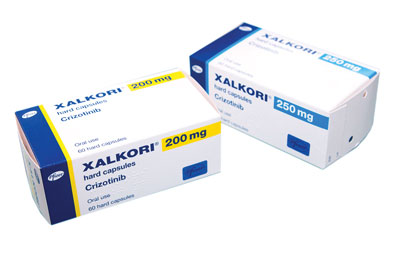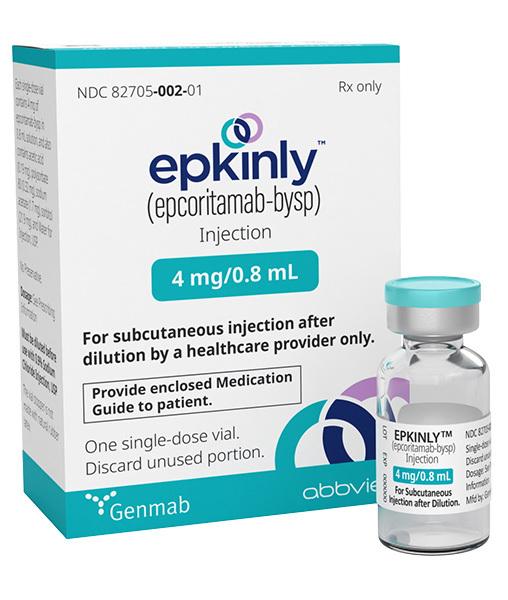Xalkori (crizotinib) vs Epkinly (epcoritamab-bysp)
Xalkori (crizotinib) vs Epkinly (epcoritamab-bysp)
Xalkori (crizotinib) is an oral small molecule tyrosine kinase inhibitor specifically designed to target and inhibit anaplastic lymphoma kinase (ALK) positive and ROS1-positive non-small cell lung cancer (NSCLC). In contrast, Epkinly (epcoritamab-bysp) is an investigational bispecific antibody designed for the treatment of hematological malignancies, such as non-Hodgkin lymphoma, by targeting both CD20 on B-cells and CD3 on T-cells to engage the body's immune system to attack cancer cells. When deciding between these medications, it is crucial to consider the specific type of cancer being treated, as Xalkori is tailored for certain lung cancers, while Epkinly is aimed at treating certain blood cancers, and the choice should be guided by a healthcare professional based on the patient's individual diagnosis and treatment plan.
Difference between Xalkori and Epkinly
| Metric | Xalkori (crizotinib) | Epkinly (epcoritamab-bysp) |
|---|---|---|
| Generic name | Crizotinib | Epcoritamab-bysp |
| Indications | Non-small cell lung cancer (NSCLC), ALK or ROS1 positive | B-cell non-Hodgkin lymphoma |
| Mechanism of action | ALK and ROS1 tyrosine kinase inhibitor | CD20-directed cytolytic antibody |
| Brand names | Xalkori | Epkinly |
| Administrative route | Oral | Intravenous |
| Side effects | Visual disorders, GI disturbances, edema, elevated liver enzymes, etc. | Infusion-related reactions, cytopenias, infections, fatigue, etc. |
| Contraindications | Hepatic impairment, concurrent use of strong CYP3A inhibitors/inducers | Known hypersensitivity to epcoritamab or its excipients |
| Drug class | Tyrosine kinase inhibitor | Monoclonal antibody |
| Manufacturer | Pfizer | Genmab and AbbVie |
Efficacy
Xalkori (Crizotinib) and its Efficacy in Lymphoma
Xalkori (crizotinib) is a small molecule tyrosine kinase inhibitor primarily approved for the treatment of non-small cell lung cancer (NSCLC) with specific genetic alterations. However, its efficacy in lymphoma, particularly anaplastic large cell lymphoma (ALCL), has been a subject of research due to the presence of similar genetic alterations targeted by crizotinib. ALCL is a subtype of non-Hodgkin lymphoma characterized by the presence of an abnormal form of the anaplastic lymphoma kinase (ALK) protein. Crizotinib has demonstrated efficacy in ALCL patients who express the ALK protein, leading to tumor regression and in some cases, durable remissions. It is important to note that the use of crizotinib in lymphoma is considered off-label, and its efficacy may vary based on the individual patient's genetic profile and disease characteristics.
Epkinly (Epcoritamab-bysp) and its Efficacy in Lymphoma
Epkinly (epcoritamab-bysp) is an investigational bispecific antibody designed to target both CD3 on T-cells and CD20 on B-cells. While it is not yet approved for any indication, epcoritamab has shown promise in early clinical trials for the treatment of B-cell non-Hodgkin lymphomas, which include a variety of lymphoma subtypes such as diffuse large B-cell lymphoma (DLBCL) and follicular lymphoma. The mechanism of action involves recruiting the body's own T-cells to attack and kill the CD20-expressing B-cell lymphoma cells. Clinical trial data has suggested that epcoritamab can induce responses in a significant proportion of patients, including those who have relapsed or are refractory to existing therapies.
Comparative Efficacy in Lymphoma
When comparing the efficacy of Xalkori (crizotinib) and Epkinly (epcoritamab-bysp) in the treatment of lymphoma, it is crucial to consider the different subtypes of lymphoma and their respective molecular targets. Crizotinib's efficacy is more specific to ALCL with ALK expression, whereas epcoritamab's potential application is broader within the B-cell non-Hodgkin lymphoma category due to its targeting of CD20. Both agents represent a targeted approach to lymphoma treatment, aiming to exploit the unique biological characteristics of the cancer cells. However, as epcoritamab is still in the investigational stage, its full efficacy and safety profile is yet to be established through ongoing clinical trials.
Conclusion
Both Xalkori (crizotinib) and Epkinly (epcoritamab-bysp) have shown efficacy in the treatment of different subtypes of lymphoma, albeit in different contexts. Crizotinib has been used off-label for ALK-positive ALCL, showing beneficial outcomes in certain cases, while epcoritamab is an emerging therapy with promising results in early trials for B-cell non-Hodgkin lymphomas. The continued investigation and clinical trials of these agents will further elucidate their roles in the treatment landscape of lymphoma and potentially expand the therapeutic options available to patients with this heterogeneous group of diseases.
Regulatory Agency Approvals
Xalkori
-
European Medical Agency (EMA), European Union

-
Food and Drug Administration (FDA), USA

-
Health Canada

-
Pharmaceuticals and Medical Devices Agency (PMDA), Japan

-
Therapeutic Goods Administration (TGA), Australia

Epkinly
-
Food and Drug Administration (FDA), USA

Access Xalkori or Epkinly today
If Xalkori or Epkinly are not approved or available in your country (e.g. due to supply issues), you can access them via Everyone.org.
How it works

Make an enquiry
Choose the medicine you want to buy, answer a couple of questions, and upload your prescription to speed things up. We’ll get back to you within 24 hours.


Make an enquiry
Choose the medicine you want to buy, answer a couple of questions, and upload your prescription to speed things up. We’ll get back to you within 24 hours.


Breeze through the paperwork
We'll guide you through the required documents for importing unapproved medicine, ensuring you have all the necessary information.


Get a personalized quote
We’ll prepare a quote for you, including medicine costs and any shipping, administrative, or import fees that may apply.


Receive your medicine
Accept the quote and we’ll handle the rest - sourcing and safely delivering your medicine.

Some text on this page has been automatically generated. Speak to your physician before you start a new treatment or medication.
Let's talk
If you have any questions, call us or send us a message through WhatsApp or email:
Contact us




